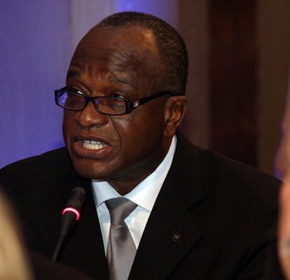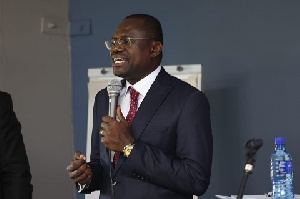Mr. Paul Victor Obeng, Chairman of the National Development Planning Commission (NDPC) has stated that the tension between mining multinationals and local businesses had usurped the legitimate business opportunity and practices in mining communities.
He said there was tension between illegal small scale miners who had forcefully taken over mining concessions to ply “galamsey” trade without regard to rights, environmental degradation and dangers to human life and property often at the peril of their lives.
Mr. Obeng said this when he addressed participants at the maiden mining forum in Accra on Wednesday.
He indicated that the forum represented the assembly of beneficiaries of the mineral sector to deliberate on activities which would help identify and deepen the impact of the sector as a long term development that would result in enhancing the welfare of the people and their development partners.
He noted that the move would help resolve and put the sector in a better position to impact more than it had been.
Mr. Obeng said the tension that arose between operators and ordinary people had accounted to loss of land in exchange for a one-time compensation payment, which did not enable them to resettle in alternative livelihood engagements and therefore slide into growing poverty in spite of the affluence around them.
He said a mineral disbursement policy which allowed for investment of a stated percentage of it in sustainable economic activities such as agriculture, infrastructure, manufacturing and tourism, would make a lot of difference as was applied to revenue from petroleum.
Mr. Fred Ohene Keya, Chairman of the maiden National Mining Forum, said the collaboration between the Ministry of Lands and Natural Resources and Minerals Commission was to provide a platform for stakeholders in the mining sector to make out an effective engagement in managing the resources.
He said the forum was put in three phases to strengthen stakeholders to collaborate specifically among regulators, industry, academia and civil society; sensitize and inform the general public on the status and trends in Ghana’s mining industry and to develop practical recommendations for effective management of the mining industry.
He indicated that Government has a critical role to play in terms of formulating policies, legislation and guidelines in regulating the industry.
Mr. Mike Allen Hammah, Minister for Lands and Natural Resources, mentioned that the negative social and environmental impact of mining outweighed any economic benefits mining could provide though there were strong advocates for the potential of the sector as a developmental tool, citing the wealth and economic development that had been created from mining in some industrialized countries.
He said achieving the desired net positive impact would require effective management of the mineral resources the country was endowed with and on a sustainable basis.
Mr. Hammah indicated that achieving the pursuit of this objective had given birth to the first ever National Mining Forum in assimilating a constructive feedback from all stakeholders and the general public.
He noted that the draft National Mining Policy, which was subjected to extensive stakeholder consultations and currently being finalized by Cabinet’s consideration would ensure that mining was promoted only to the extent that it would result in a win-win situation for Government, local communities and investors.
He said it would also complement the mining policy, to promote diversification of minerals development with greater potential for linkages with other sectors of the economy.**
Regional News of Thursday, 12 July 2012
Source: GNA
Environmental impact of mining outweighs economic benefits - Mike Hammah













